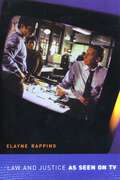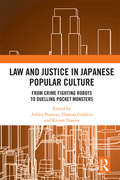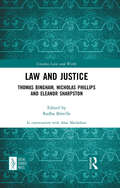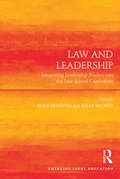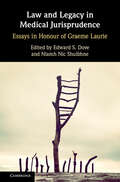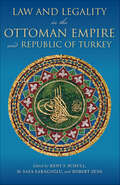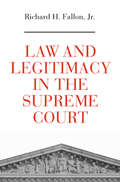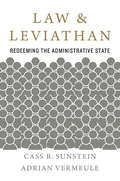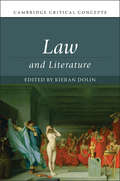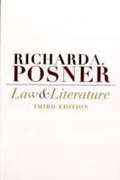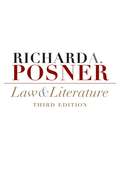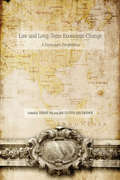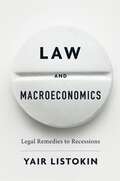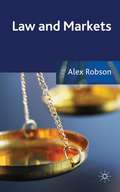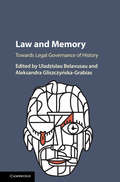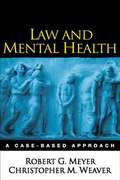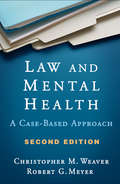- Table View
- List View
Law and Justice as Seen on TV
by Elayne RappingLaw and Justice as Seen on TV examines the impact, significance, and social and political problems raised by the enormous onslaught of law-related television programming, both fiction and nonfiction, in the years since the rise of live televised trials as major media events. The book weaves together the various strands—media history and analysis, legal history and policy, and the national turn to the political right in the last decades—which gave birth to this trend and has kept it thriving and growing, by leaps and bounds, to the present day. Beginning with the history of courtroom drama on TV and its various contradictions and shifts, since the late 1940s to the present, the book analyzes the various entertainment series and genres that have so proliferated in recent years, giving special attention to such popular and influential series as "Law and Order" and "Cops." The second section begins by charting the complex and contested history of the coming of cameras to the courtroom and the way in which that legal decision led to televised trials and to the rise of Court TV. It examines as especially interesting and important the major trials—such as those of the Menendez brothers, O.J. Simpson, and Timothy McVeigh—which helped to shape the way television came to frame trials and their social implications for public consumption. From there it examines major social issues—gender violence, youth crime, family dysfunction, victims' rights which, with the rise of the courtroom as a major political and television arena, have come to be viewed largely as legal issues to be discussed and determined in legal terms by Americans in general. Accessible and lucid, Law and Justice as Seen on TV concludes with an examination of the broad implications of this social and cultural trend, closing with some thoughts about its expansion, on television and in the actual legal arena, during the "war on terrorism" in the wake of 9/11.
Law and Justice in Japanese Popular Culture: From Crime Fighting Robots to Duelling Pocket Monsters
by Kieran Tranter Thomas Giddens Ashley PearsonIn a world of globalised media, Japanese popular culture has become a signifi cant fountainhead for images, narrative, artefacts, and identity. From Pikachu, to instantly identifi able manga memes, to the darkness of adult anime, and the hyper- consumerism of product tie- ins, Japan has bequeathed to a globalised world a rich variety of ways to imagine, communicate, and interrogate tradition and change, the self, and the technological future. Within these foci, questions of law have often not been far from the surface: the crime and justice of Astro Boy; the property and contract of Pokémon; the ecological justice of Nausicaä; Shinto’s focus on order and balance; and the anxieties of origins in J- horror. This volume brings together a range of global scholars to refl ect on and critically engage with the place of law and justice in Japan’s popular cultural legacy. It explores not only the global impact of this legacy, but what the images, games, narratives, and artefacts that comprise it reveal about law, humanity, justice, and authority in the twenty-first century.
Law and Justice: Thomas Bingham, Nicholas Phillips and Eleanor Sharpston (Creative Lives and Works)
by Alan MacfarlaneLaw and Justice: Thomas Bingham, Nicholas Phillips and Eleanor Sharpston is the first time a collection of interviews is being published as a book. These interviews have been conducted by one of England’s leading social anthropologists and historians, Professor Alan Macfarlane. Filmed over a period of several years, the three conversations in this volume are part of the series Creative Lives and Works. These transcriptions also form part of a larger set of interviews that cut across various disciplines, from the social sciences, the sciences and the performing and visual arts. The current volume is on three of Britain’s foremost lawyers and judges. Law and justice are an intrinsic part of any civilization, ancient or modern. English law traces its origins to medieval times, at times drawing on ancient legal systems prevalent in Roman and Anglo-Saxon laws. This tradition has had a huge influence across the world through export to the United States and throughout the nations of the former British Empire. The three conversations in this volume further reflect how interconnected the disciplines of history and law are. Thomas Bingham, Nicholas Phillips and Eleanor Sharpston give a wide sketch of the legal system through their own experiences and interpretations. They show how one of the single most important and unique features of British civilization works. The book will be of enormous value not just to those interested in the subject of Law and Justice but also History and Culture Studies as well as those with an interest in Legal Literature. Please note: This title is co-published with Social Science Press, New Delhi. Taylor & Francis does not sell or distribute the Hardback in India, Pakistan, Nepal, Bhutan, Bangladesh and Sri Lanka.
Law and Language
by John Witte Jr. Harold J. BermanCompleted in 1964, Harold J. Berman's long-lost tract shows how properly negotiated, translated and formalised legal language is essential to fostering peace and understanding within local and international communities. Exemplifying interdisciplinary and comparative legal scholarship long before they were fashionable, it is a fascinating prequel to Berman's monumental Law and Revolution series. It also anticipates many of the main themes of the modern movements of law, language and ethics. In his Introduction, John Witte, Jr, a student and colleague of Berman, contextualises the text within the development of Berman's legal thought and in the evolution of interdisciplinary legal studies. He has also pieced together some of the missing sections from Berman's other early writings and provided notes and critical apparatus throughout. An Afterword by Tibor Várady, another student and colleague of Berman, illustrates via modern cases the wisdom and utility of Berman's theories of law, language and community.
Law and Leadership: Integrating Leadership Studies into the Law School Curriculum (Emerging Legal Education)
by Paula Monopoli Susan MccartyLeadership includes the ability to persuade others to embrace one’s ideas and to act upon them. Teaching law students the art of persuasion through advocacy is at the heart of legal education. But historically law schools have not included leadership studies in the curriculum. This book is one of the first to examine whether and how to integrate the theory and practice of leadership studies into legal education and the legal profession. Interdisciplinary in its scope, with contributions from legal educators and practitioners, the book defines leadership in the context of the legal profession and explores its challenges in legal academia, private practice, and government. It also investigates whether law students need to study leadership and, if they should, why it should be offered as part of the curriculum. Finally, it considers how leadership should be taught and how it should be integrated into classes. It evaluates new leadership courses and the adaptation of existing courses to reflect on how to effectively blend law and leadership in doctrinal, clinical, and experiential classrooms. The book includes a foreword by Pulitzer Prize-winning historian and noted leadership scholar, James MacGregor Burns and a foundational essay by prominent leadership scholar and one of the founders of the International Leadership Association, Georgia Sorenson. It will be a valuable resource to anyone interested in leadership, education policy and legal ethics.
Law and Legacy in Medical Jurisprudence: Essays in Honour of Graeme Laurie
by Niamh Nic Shuibhne Edward S. DoveGraeme Laurie stepped down from the Chair in Medical Jurisprudence at the University of Edinburgh in 2019. This edited collection pays tribute to his extraordinary contributions to the field. Graeme often spoke about the importance of 'legacy' in academic work and forged a remarkable intellectual legacy of his own, notably through his work on genetic privacy, human tissue and information governance, and the regulatory salience of the concept of liminality. The essays in this volume animate the concept of legacy to analyse the study and practice of medical jurisprudence. In this light, legacy reveals characteristics of both benefit and burden, as both an encumbrance to and facilitator of the development of law, policy and regulation. The contributions reconcile the ideas of legacy and responsiveness and show that both dimensions are critical to achieve and sustain the health of medical jurisprudence itself as a dynamic, interdisciplinary and policy-engaged field of thinking.
Law and Legal Practice in Egypt from Alexander to the Arab Conquest: A Selection Of Papyrological Sources In Translation, With Introductions And Commentary
by J. G. Manning James G. Keenan J. G. Manning Uri Yiftach-Firanko James G. KeenanThe study of ancient law has blossomed in recent years. In English alone there have been dozens of studies devoted to classical Greek and Roman law, to the Roman legal codes, and to the legal traditions of the ancient Near East among many other topics. Legal documents written on papyrus began to be published in some abundance by the end of the nineteenth century; but even after substantial publication history, legal papyri have not received due attention from legal historians. This book blends the two usually distinct juristic scholarly traditions, classical and Egyptological, into a coherent presentation of the legal documents from Egypt from the Ptolemaic to the late Byzantine periods, all translated and accompanied by expert commentary. The volume will serve as an introduction to the rich legal sources from Egypt in the later phases of its ancient history as well as a tool to compare legal documents from other cultures.
Law and Legal Process
by Matthew Dyson David IbbetsonThis collection of papers from the Twentieth British Legal History Conference explores the relationship between substantive law and the way in which it actually worked. Instead of looking at what the courts said they were doing, it is concerned more with the reality of what was happening. To that end, the authors use a wide range of sources, from court records to merchants' diaries and lawyers' letters. The way in which the sources are used reflects the possibilities of legal historical research which are opening up in the twenty-first century, as large databases and digitised images – and even online auction sites – make it a practical possibility to do work at a level which was almost unthinkable only a short time ago.
Law and Legality in the Ottoman Empire and Republic of Turkey
by Kent F. Schull Robert Zens M. Safa SaraçoğluThe editors of this volume have gathered leading scholars on the Ottoman Empire and the Republic of Turkey to chronologically examine the sweep and variety of sociolegal projects being carried in the region. These efforts intersect issues of property, gender, legal literacy, the demarcation of village boundaries, the codification of Islamic law, economic liberalism, crime and punishment, and refugee rights across the empire and the Aegean region of the Turkish Republic.
Law and Legalization in Transnational Relations (Routledge Advances in International Relations and Global Politics #Vol. 54)
by Christian Brütsch Dirk LehmkuhlThis volume addresses the emergence of multiple legal and law-like arrangements that alter the interaction between states, their delegated agencies, international organizations and non-state actors in international and transnational politics. Political scientists and legal scholars have been addressing the ‘legalization’ of international regimes and international politics, and engaging in interdisciplinary research on the nature, the causes and the effects of the norm driven controls over different areas and dimensions of global governance. Written by leading contributors in the field, the book claims that the emergence and spread of legal and law-like arrangements contributes to the transformation of world politics, arguing that ‘legalization’ does not only mean that states co-operate in more or less precise, binding and independent regimes, but also that different types of non-state actors can engage in the framing, definition, implementation and enforcement of legal and law-like norms and rules. To capture these diverse observations, the volume provides an interpretative framework that includes the increase in international law-making, the variation of legal and legalized regimes and the differentiation of legal and law-like arrangements. Law and Legalization in Transnational Relations is of interest to students and researchers of international politics, international relations and law.
Law and Legitimacy in the Supreme Court
by Richard H. Fallon Jr.Richard Fallon offers theories of constitutional law and judicial legitimacy that accept many tenets of legal realism but reject its corrosive cynicism. Based on an ideal of good faith, his account both illuminates current practice and prescribes urgently needed responses to a legitimacy crisis in which the Supreme Court is increasingly enmeshed.
Law and Leviathan: Redeeming The Administrative State
by Cass R. Sunstein Adrian VermeuleFrom two legal luminaries, a highly original framework for restoring confidence in a government bureaucracy increasingly derided as “the deep state.”Is the modern administrative state illegitimate? Unconstitutional? Unaccountable? Dangerous? Intolerable? American public law has long been riven by a persistent, serious conflict, a kind of low-grade cold war, over these questions.Cass Sunstein and Adrian Vermeule argue that the administrative state can be redeemed, as long as public officials are constrained by what they call the morality of administrative law. Law and Leviathan elaborates a number of principles that underlie this moral regime. Officials who respect that morality never fail to make rules in the first place. They ensure transparency, so that people are made aware of the rules with which they must comply. They never abuse retroactivity, so that people can rely on current rules, which are not under constant threat of change. They make rules that are understandable and avoid issuing rules that contradict each other.These principles may seem simple, but they have a great deal of power. Already, without explicit enunciation, they limit the activities of administrative agencies every day. But we can aspire for better. In more robust form, these principles could address many of the concerns that have critics of the administrative state mourning what they see as the demise of the rule of law. The bureaucratic Leviathan may be an inescapable reality of complex modern democracies, but Sunstein and Vermeule show how we can at last make peace between those who accept its necessity and those who yearn for its downfall.
Law and Lies
by Austin SaratLaw has a strangely complicated relationship to deception. Though it sometimes takes a hard line on behalf of truth - 'the truth, the whole truth, and nothing but the truth' - competing values often cause law to look the other way. How and why is lying alternately accepted, condemned, or prosecuted? What are the government's interests in allowing or disallowing lying? Law and Lies is the first book to thematically address the role of lying in the American legal system. Undercover police agents are permitted to lie in the name of catching criminals, and government officials are permitted to lie in service of national security. In the case of the military's 'Don't ask, don't tell' policy, lying was not only permitted, but actively encouraged. A range of illuminating case studies reveal that the government's tolerance of deception is rarely as simple as the 'whole truth'.
Law and Literature (Cambridge Critical Concepts)
by Kieran DolinLaw and Literature presents an authoritative, fresh and accessible new overview of the many ways in which law and literature interact. Written by a team of international experts, it provides a multi-focused history of literary studies' critical interest in ideas of law and justice. It examines the effects of law on writers and their work, ranging from classical tragedy to comics, and from East Africa to Elizabethan England. Over twenty chapters, contributors reveal the intricate and multivalent historical interactions between law and literature, both past and present, and trace the intellectual genesis of the concept of law in literary studies, focusing on major developments in the history of the interdisciplinary project of law and literature, as well as the changing ideas of law, and the cultural contests in which it has figured. Law and Literature will appeal to graduates and scholars working on the intersection between law and literature and in key related areas such as literature and human rights. Provides a multi-focused history of literature's critical interest in ideas of law and justice. Explores how legal concepts and practices contribute to literary studies. Presents a history of law and literature, and its contemporary applications.
Law and Literature (Third Edition)
by Richard A. PosnerHailed in its first edition as an "outstanding work, as stimulating as it is intellectually distinguished" (New York Times), Law and Literature has handily lived up to the Washington Post's prediction that the book would "remain essential reading for many years to come. " This third edition, extensively revised and enlarged, is the only comprehensive book-length treatment of the field. It continues to emphasize the essential differences between law and literature, which are rooted in the different social functions of legal and literary texts. But it also explores areas of mutual illumination and expands its range to include new topics such as the cruel and unusual punishments clause of the Constitution, illegal immigration, surveillance, global warming and bioterrorism, and plagiarism. In this edition, literary works from classics by Homer, Shakespeare, Milton, Dostoevsky, Melville, Kafka, and Camus to contemporary fiction by Tom Wolfe, Margaret Atwood, John Grisham, and Joyce Carol Oates come under Richard Posner's scrutiny, as does the film The Matrix. The book remains the most clear, acute account of the intersection of law and literature.
Law and Literature in Europe and Beyond (Literatur und Recht #15)
by Klaus StierstorferThis book aims to contribute to an understanding of the processes in which law and literature combine in conceptualizing Europe. This can take place with regard to important national and local issues of wider significance, or in the establishment of connections between European nations, but also far beyond the confines of Europe, where European concepts of law and literature have had cultural effects.
Law and Literature: A Study Based on Traditional Chinese Drama (China Perspectives)
by Zhu SuliBased on the texts of traditional Chinese dramas such as The Orphan of Zhao, Liang Shangbo and Zhu Yingtai, The Injustice to Dou E, and The Fifteen Strings of Cash, the book aims to broaden the scope of law and literature in China.Adopting a comprehensive and interdisciplinary approach of legal theory, literature, sociology, economics, and political science, the author analyzes some theoretical issues that are of the law or relevant to law in these literary playscripts, which breaks the Chinese tradition of moral reading and integrates literary study or humanitarian studies into the study of social sciences. In addition, the book discusses the history, status quo, and prospects of law and literature research in China and reflects on its value and methodology.The book will appeal to scholars and postgraduate students of legal theory, Chinese literature, and legal history.
Law and Literature: Third Edition
by Richard A. PosnerHailed in its first edition as an “outstanding work, as stimulating as it is intellectually distinguished” (New York Times), Law and Literature has handily lived up to the Washington Post’s prediction that the book would “remain essential reading for many years to come.” This third edition, extensively revised and enlarged, is the only comprehensive book-length treatment of the field. It continues to emphasize the essential differences between law and literature, which are rooted in the different social functions of legal and literary texts. But it also explores areas of mutual illumination and expands its range to include new topics such as the cruel and unusual punishments clause of the Constitution, illegal immigration, surveillance, global warming and bioterrorism, and plagiarism. In this edition, literary works from classics by Homer, Shakespeare, Milton, Dostoevsky, Melville, Kafka, and Camus to contemporary fiction by Tom Wolfe, Margaret Atwood, John Grisham, and Joyce Carol Oates come under Richard Posner’s scrutiny, as does the film The Matrix. The book remains the most clear, acute account of the intersection of law and literature.
Law and Long-Term Economic Change
by Debin Ma Jan Luiten van ZandenRecently, a growing body of work on "law and finance" and "legal origins" has highlighted the role of formal legal institutions in shaping financial institutions. However, these writings have focused largely on Europe, neglecting important non-Western traditions that prevail in a large part of the world. Law and Long-Term Economic Changebrings together a group of leading scholars from economics, economic history, law, and area studies to develop a unique, global and, long-term perspective on the linkage between law and economic change. Covering the regions of Western Europe, East and South Asia, and the Middle East, the chapters explore major themes regarding the nature and evolution of different legal regimes; their relationship with the state or organized religion; the definition and interpretation of ownership and property rights; the functioning of courts, and other mechanisms for dispute resolution and contract enforcement; and the complex dynamics of legal transplantations through processes such as colonization. The text makes clear that the development of legal traditions and institutions-as embodiments of cultural values and norms-exerts a strong effect on long-term economic change. And it demonstrates that a good understanding of legal origins around the world enriches any debate about Great Divergence in the early modern era, as well as development and underdevelopment in 19th-20th century Eurasia.
Law and Macroeconomics: Legal Remedies to Recessions
by Yair ListokinAfter 2008, private-sector spending took a decade to recover. Yair Listokin thinks we can respond more quickly to the next meltdown by reviving and refashioning a policy approach, used in the New Deal, to harness law’s ability to function as a macroeconomic tool, stimulating or relieving demand as required under certain crisis conditions.
Law and Markets
by Alex RobsonLaw and Markets examines the interaction between legal rules, market forces and prices. It emphasises the economic effects of legal rules on individual incentives in both market and non-market settings, and draws on cases and materials from a wide variety of legal jurisdictions to illustrate economic principles.
Law and Memory: Towards Legal Governance of History
by Uladzislau Belavusau Gliszczyńska-Grabias AleksandraLegal governance of memory has played a central role in establishing hegemony of monumental history, and has forged national identities and integration processes in Europe and beyond. In this book, a range of contributors explore both the nature and role of legal engagement into historical memory in selected national law, European and international law. They also reflect on potential conflicts between legal governance, political pluralism, and fundamental rights, such as freedom of expression. In recent years, there have been numerous monumental commemoration practices and judicial trials about correlated events all over the world, and this is a prime opportunity to undertake an important global comparative scrutiny of memory laws. Against the background of mass re-writing of history in different parts of the world, this book revisits a fascinating subject of memory laws from the standpoint of comparative law and transitional justice.
Law and Mental Health
by Christopher M. Weaver Robert G. MeyerThis volume presents classic and contemporary legal cases that have set important precedents related to psychological and mental health issues in criminal and civil proceedings; the role of practitioners as expert witnesses and forensic consultants; and legal concerns in general clinical practice. Engagingly written, the book brings to life the details of each case and the personal stories involved, while also providing a solid introduction to foundational issues in the field. Forensic and clinical professionals will find this a highly informative resource, and it will also be useful for undergraduate- and graduate-level courses and professional training.
Law and Mental Health, Second Edition: A Case-Based Approach
by Christopher M. Weaver Robert G. MeyerFavored by instructors and students for its real-world focus and engaging style, this authoritative text on the interface of psychology and law has now been revised and expanded. Each chapter provides an overview of case law on an important topic and explores selected cases in depth. Coverage includes psychological and mental health issues in criminal and civil proceedings; the role of practitioners as expert witnesses and forensic consultants; and legal concerns in general clinical practice. Salient legal processes and decisions are summarized and implications for today's clinical and forensic practitioners highlighted. Instructors who adopt the book for courses will receive a supplemental test bank with questions keyed to each chapter. Students can access a downloadable Study Guide. New to This Edition *Updated throughout with current research and substantive changes in mental health law. *Chapter on competency in juvenile justice. *Citations of 115 new legal cases. *Conclusion identifying urgent social challenges facing the field. Pedagogical Features *Boxes on key concepts and areas of controversy. *"Where are They Now?" boxes revisiting people from landmark cases. *Updated test bank and new downloadable Study Guide. *End-of-chapter lists of legal cases discussed.
Law and Migration in a Changing World (Ius Comparatum - Global Studies in Comparative Law #31)
by Marie-Claire Foblets Jean-Yves CarlierThis volume comprises national reports on migration and migration law from 17 countries representing all continents. The vast majority of these are countries of immigration, which means they face specific challenges in terms of managing migratory flows that are increasingly linked with climate change and scarce natural resources worldwide, and they need to find viable ways to integrate humanitarian migration. Unlike so many recent publications in the field of international migration law, this book brings together reports on diverse countries that are rarely regarded as part of one and the same picture, depicting globalized migration in the contemporary era that to a large extent challenges state sovereignty. The contributions delineate the legal regimes that individual states are continually developing and modifying with a view to managing and controlling access of individual persons to their respective territories. They also show how the restrictive measures that states resort to in the event of failure to manage migration could have a lasting legal impact. The General Report preceding the country reports provides a comparative overview of the national reports, and is divided into two parts. The first, more technical in nature, addresses the classic questions relating to admission to and residence in a country. The second, more reflective section, examines the relationship between laws and migration in a wider and multidisciplinary perspective. To allow a robust comparison, the country reports all follow a similarly wide-ranging structure; to the extent possible, they also cover the historical, sociological and demographic factors that help explain legal regimes and migratory flows in each country. Each country report includes analyses of recent legislative developments and delicate questions that are still awaiting adequate (legal) responses as well as perspectives for the future.
